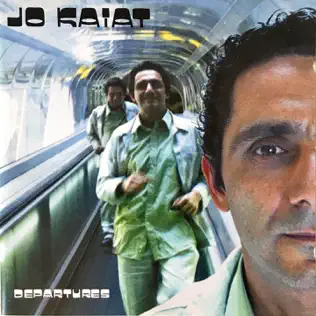Jo Kaiat - Departures
Table of Contents
Download
Filename: jo-kaiat-departures.rar- MP3 size: 60 mb
- FLAC size: 541.5 mb
Tracks
| Track | Duration | Preview |
|---|---|---|
| Bajalamale | ||
| Koredouga Cocktail | ||
| Piano Mandingue | ||
| Indian Niçart | ||
| Shiva Ranjani | ||
| African Niçart | ||
| Tchaouara | ||
| Siraba | ||
| Du Maroc Au Mali | ||
| Hindol | ||
| Cœur Battant | ||
| Moudal | ||
| Lalit | ||
| Des | ||
| Denfa |
Images




Catalog Numbers
3984-29054-2Labels
DetourListen online
- online anhören
- kuunnella verkossa
- ascolta in linea
- escuchar en línea
- ouvir online
- lyssna på nätet
- lytte på nettet
- online luisteren
- écouter en ligne
Formats
- 2 × CD
- Album
Companies
| Role | Company |
|---|---|
| Phonographic Copyright (p) | Erato Disques |
| Copyright (c) | Erato Disques |
Barcodes
Barcode: 639842905428About Jo Kaiat
Born in Nice in 1960, Jo Kaiat devotes himself to music, a territory whose limits are only those that man wants to give himself. His odyssey begins with jazz but, very quickly, the swing proves to be not enough to express all that is inside in him. He then turned to Bela Bartok, Olivier Messiaen, Stravinsky and the Impressionists. He spent his teenage years crunching chords in search of a mystery. At 18, he went to Paris. He stays there for five years, playing with Steve Potts, Oliver Johnson, Jean Jaques Avenel, Georges Brown, Jean Yves Colson, Jef Sicard& then he returned to Nice where he continued his musical activities with Barney Wilen, Bibi Rovere, Jack Sewing& With Jo Kaiat it is about travelling but travelling in depth, it is every time to try to make the tour of something. Thus he continued his research in harmonies in Israel where he studied composition at the Rubin Academy, killing two birds with one stone, this stage, which lasts six years, allows him to rediscover something of his roots while deepening his knowledge of classical music. In the same way when he then decided to dig a little deeper into jazz, he spent two years in New York where he played with musicians from Greenwich Village and Harlem such as Dennis Charles, Andy Mccloud, Steve Neils, Clifford Barbaro, Evelyne Blackey, Ernie Barnes, Duke Cleammons, Avishai Cohen, Amos Hoffman&
With all these experiences, Jo Kaiat is finally ready for Africa, a continent where his origins lay., a beating heart that echoed everything against his own and that has always called him. He first went to Morocco, where he played with the gnawas and the Berbers, then went to Mali and met the bambaras who became his adopted family. Since mid-1995, Jo Kaiat has lived in Mali. He returned to France in 2000.
There are two pianos in Jo Kaiat, the harmonic, melodic piano, and the rhythmic piano, he would even like to realize this duality one day by playing with another pianist. While waiting to be able to realize this dream, his first two albums totally embody this double aspect of his game as much as his personality. On the one hand, the Bamako trio with its two Malian percussionists, Cheick Fantamady Kone at the Doum-Doum (born 1975 in Bougouni) and Ousmane Keita at the Djembe and Kamélin n'goni (born 1973 in Bamako), allow him to take advantage of all his research in rhythm. On the other the Delhi trio with Johar Ali Kahn on the violin (son and disciple of the last Ustad Gohar Ali Kahn of Rampur) and Shabaz Hussein Kahn at the tabla (Pakistani, Punjab, from the same family as Johar), provides him with the opportunity to dialogue with Indian fashions within compositional measures, more rhythmically complex.
For Jo Kaiat everything is a matter of encounters, dialogues. Jo Kaiat constantly strives for bridges between different cultures: brings together the gnawas, bambaras (who have a common history) in «From Morocco to Mali»; connects the melancholic accents of Satie to those of India and makes room for its oriental influences in «Lalit» and « Beating heart ». But he does not only find links between his culture and that of others, he also spends his time finding links between his instrument and that of others. After these multiple paths, it is not surprising that Jo Kaiats music expresses an authentic blend.
Real Name
- Jo Kaiat
Name Vars
- Jo Kaiat
